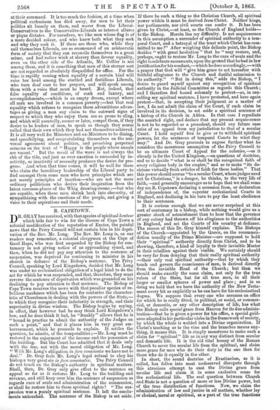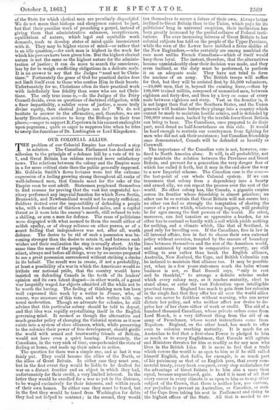CAPETOWN. D R. GRAY has received, with that species of spiritual
hauteur which bids fair to win for the diocese of Cape Town a colonial modification of the reputation of Exeter, the painful news that the Privy Council will not sustain him in his depri- vation of the Rev. Mr. Long. The Rev. Mr. Long is, as our readers may remember, a colonial clergyman at the Cape of Good Hope, who was first suspended by the Bishop for con- tumacy in not giving notice of an approaching synod, and then, when he did not pay any attention to the sentence of suspension, was deprived for continuing to minister in his church in defiance of the Bishop's sentence. The Privy Council, speaking by Lord Kingsdown, decided that Mr. Long was under no ecclesiastical obligation of a legal kind to do the act for which he was suspended, and that, therefore, they must reverse the sentence of deprivation which was grounded on his declining to pay attention to that sentence. The Bishop of Cape Town receives the news with that peculiar species of re- bellious meekness which has been for centuries the character- istic of Churchmen in dealing with the powers of the State,— to which they recognize their inferiority in strength, and their superiority in divine wisdom. The Bishop begins by saying, in effect, that however bad he may think Lord Kingsdown's law, and he does think it bad, he "frankly" allows that he is "bound in practice to admit the authority of the Judges on such a point," and that it places him in very great em- barrassment, which he proceeds to explain. It settles the question, he admits, of the temporalities ;—Mr. Long must be restored to the enjoyment of the income and the possession of the building. But the Court has admitted that it deals only with the law, not with the moral obligation of Mr. Long. "With Mr. Long's obligation in foro conscientice we have not to deal." Dr. Gray feels Mr. Long's legal refusal to obey his bishop a very great sin in fore conseientice. The Privy Council do not touch on the Bishop's authority in spiritual matters. Shall, then, Dr. Gray only give effect to the sentence on appeal so far as it restores Mr. Long to the building and revenue, and still keep over him the sentence of suspension as regards cure of souls and administration of the communion, or shall he restore him to these spiritual rights? "The sus- pension was a purely spiritual sentence. It left the emolu- ments untouched. The sentence of the Bishop is set aside. If there be such a thing as the Christian Church, all spiritual power within it must be derived from Christ. Neither kings, nor parliaments, nor civil courts can confer it. It has been given by Christ,—at least, so the Church of England holds— to the Bishop. Herein lies my difficulty. Is not acquiescence in this assumption a surrender of spiritual authority to a tem- poral Court, and a betrayal of the trust which Christ has com- mitted to me ?" After weighing this delicate point, the Bishop decides "with great hesitation" that he "may restore, and, perhaps, ought to restore Mr. Long to the cure of souls and the right to celebrate sacraments, upon the groand that he had in law justification for his conduct,—which he does accordingly,—with a prayer that God will "give him grace to act hereafter with faithful allegiance to the Church and dutiful submission to its authority." "But in doing this," adds the Bishop, "I desire to guard myself against any recognition of spiritual authority in the Judicial Committee as regards this Church ; and I therefore feel bound solemnly to protest—as, in can- celling my spiritual sentence, I have protested, and here again protest—that, in accepting their judgment as a matter of law, I do not admit the claim of the Court, if such claim be involved in its decision, to set aside a spiritual sentence of a bishop of the Church in Africa. In that case I repudiate the asserted right, and declare that my present acquiescence is not to be regarded as a precedent, should any future case arise of an appeal from my jurisdiction to that of a secular Court. I hold myself free to give or to withhold spiritual powers, let the sentences of temporal Courts be what they may." And Dr. Gray proceeds to expose further what he considers the monstrous assumption of the Privy Council to be an ultimate Court of Appeal for the colonies —aa it already is for the United Kingdom,—on questions of doctrine, and so to decide "what is or shall be the recognized faith of every religious body in the empire," and so to make "its de- cisions virtually fresh articles of faith for these bodies." That this power should accrue "to a secular Court, where judges need not be Christians," is a danger, he thinks, to the very life of faith,—and generally encourages us to hope that we shall some day see It. Capetown declaring a secession from, or declaration of independence of, the superior ecclesiastical Courts in England, and declining in his turn to pay the least obedience to their sentences.
It is curious enough that we are never surprised at this sort of contumacy in a bishop, while nothing would give us a greater shock of astonishment than to hear that the governor of any colony had thrown off his allegiance to the authorities in England, and set the Courts of his country at defiance. The reason of this Dr. Gray himself explains. The Bishops of the Church—appointed by the Queen, on the recommen- dation usually of the Prime Minister—are supposed to hold their "spiritual" authority directly from Christ, and to be showing, therefore, a kind of loyalty to their invisible Master in their rebellion against their visible. We certainly should be very far from denying that their really spiritual authority —their only real spiritual authority—that by which they touch and govern the consciences of men, is derived directly from the invisible Head of the Church; but then we should make exactly the same claim, not only for the true rulers of the State, but for all true men, in all their larger or smaller spheres of power and place ; and in so doing we hold that we have the authority of the New Testa- ment every bit as explicitly as he can have for his ecclesiastical dogma. We suppose that every one who assumes an office for which he is really fitted, in political, or social, or commer- cial, or domestic, or any other description of life, has what the Bishop calls special grace from Heaven for its due adminis- tration—that he is given a power for his office, a special guid- ance adapted to his particular niche in the framework of society, by which the whole is welded into a Divine organization. If Christ's teaching as to the vine and the branches means any- thing, it means this. It is simply monstrous to make such a claim for " spiritual " life as in any way distinct from secular and domestic life. It is the old vital heresy of the Roman Church to serer the secular life from the spiritual, and claim more grace for men who do their duty in the one than for those who do it equally in the other. In short, the sound doctrine of Erastianism, as it is called, has fallen into most undeserved disrepute through this atrocious attempt to oust the Divine grace from secular life and claim it in some exclusive sense for the ecclesiastical life. The real question between Church and State is not a question of more or less Divine power, but of the true distribution of functions. Now, we claim the administration of law and justice in all matters, whether lay or clerical, moral or spiritual, as a part of the true functions of the State for which clerical men are peculiarly disqualified. We do not mean that bishops and clergymen cannot be just, but that their peculiar work of preaching a gospel, instead of giving them that administrative calmness, receptiveness, equilibrium of nature, which legal and equitable work demands, tends to develop states of mind quite inconsistent with it. They may be higher states of mind—or rather that is an idle question,—for each man is highest in the work for which his powers have been given him. But the highest clerical nature is not the same as the highest nature for the adminis- tration of justice; it can do more to search the conscience, less by far to weigh conflicting obligations in a delicate scale. It is no answer to say that the Judges "need not be Chris- tians." Fortunately the grace of God for practical duties does not limit itself even to those who confess Him in their hearts. Unfortunately for us, Christians often do their practical work with indefinitely less fidelity than some who are not Chris- tians. The only true issue is,—do the Judges of the Privy Council decide, even on questions of doctrinal obligation, with a finer impartiality, a subtler sense of justice, a more truly divine equity, than clerical judges can do ? We do not hesitate to answer in the affirmative, and, therefore, we are hearty Erastians, anxious to keep the Bishops in their true places;—eager to support R..Capetown in his earnest onslaughts upon paganism; quite as eager to suppress him when he tries to usurp the functions of Dr. Lushington or Lord Kingsdown.































 Previous page
Previous page